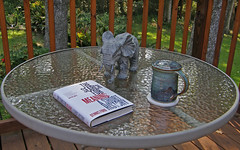Transnistria,
a sliver of land at the eastern border of Moldova, right next to the Ukraine,
wanted to be part of Russia, not Moldova, when the former Soviet Union broke
apart in 1992. Refusing to assimilate into Moldova, Transnistria continued to
use the Russian ruble even after Russia had issued new rubles and stopped
accepting the old-style currency as legal tender. The Transnistrians added a
postage stamp to the Russian rubles to indicate they were their currency.
Since
the collapse of the Soviet Union, Russian troops have been present in
Transnistria. While my husband Alex and I were in Moldova, from 1992 until
1994, General Alexander Lebed was in command of the Russian 14th Guards Army in
Moldova which was involved in skirmishes in Transnistria and another
semi-autonomous region, Gaugazia.
The
Organization for Security and Cooperation in Europe (OSCE) has had a presence
in Moldova since the early 1990s, charged with facilitating a negotiated
settlement between Moldova and Transnistria. At the time we were in Moldova,
the ambassador from the OSCE to Moldova was a Canadian. One weekend, he, his
wife, one of his local staff, Oksana, the U.S. Ambassador to Moldova Mary
Pendleton, Alex, and I set off for a relaxing few days in Odessa, on the Black
Sea coast of the Ukraine. We left Friday afternoon in two cars, the OSCE
ambassador, his wife and Oksana in one, Ambassador Pendleton, Alex, and I in
the other. The OSCE ambassador's car was in the lead since Oksana was to be our
translator for the trip. She was to explain to the guards at the Transnistrian “border,”
which the U.S. government did not recognize, why we needed to be given speedy
and unimpeded passage through Transnistria to the Ukraine.
Oksana
had been a university student in Odessa and she was very eager to show us what
Odessa had to offer. Her initial responsibility, getting us through
the Transnistrian border, was not a problem as Ambassador Pendleton was waved
through without having to stop. Once we reached Odessa, we checked in at a
private sanitarium at the edge of the city. The name conjured up visions of
patients with tuberculosis or schizophrenia, but Oksana explained it was a
place that offered a relaxing and calming setting and was very desirable for
weekend stays.
We
didn't spend much time there. That evening we headed for a meal at a restaurant
overlooking the coastline and beach. The restaurant was full of very
well-dressed, cosmopolitan young couples, some of whom looked as though they
had just walked out of a stylish European casino. There was music and dancing, although we chose to remain
spectators as the fashionably dressed couples filled the dance floor.
The
next day we toured several museums, many of them with a strong military slant.
We also went to see the Potemkin stairs, originally 200 steps leading from
the city situated on a high steppe plateau to the harbor. That evening we went
to a concert where one of the most noticeable acknowledgements of the change in
the government was the hole in the flag on the stage curtain where the hammer
and sickle had been. After the concert, Oksana suggested we go to a hotel that
was well known for its entertainment at the bar. As she had done at
nearly every other stop, she recommended that we not park directly in front of
the location we intended to spend our time. Instead, she had the OSCE
ambassador drive around the corner from the hotel where she located two parking
spots so that the two cars would be parked one in front of the other. It may have
been that desire that the two cars remain close to one another than led her to
make the recommendation. We didn't ask; we just wondered.
The
next morning, Sunday and our last day in Odessa, Oksana recommended we have
breakfast at a famous downtown restaurant before we headed a short distance out
of town to see another Ukrainian Black Sea site. At this location, there were
plenty of parking spaces directly in front of the restaurant, including on a
very wide sidewalk where others parked their cars. But instead, Oksana again
took us around the corner to park the two cars out of sight and we then walked
back to the restaurant. At the end of the meal, we walked back to the corner. It
was immediately obvious that something was wrong. There was only one car on the
street, Ambassador Pendleton's Honda. The OSCE ambassador's Lada was missing.
Instead of spending a short time at the other site after which we planned to
travel back through Transnistria, arriving at the border while it was still
daylight, we ended up back at the restaurant where we had had breakfast and
Oksana called the police.
Gasoline
was in very short supply in all of the former Soviet Union at that time, so
when Oksana got through to the police, she was asked to arrange to pick up a
policeman who would investigate the missing vehicle. Ambassador Pendleton, the
OSCE ambassador, and Oksana headed out to pick up the policeman, leaving the
OSCE ambassador's wife, Alex, and me behind.
Once
the policeman was on site, he seemed optimistic that they would be able to find
the ambassador's car. He recommended that we just wait. In the meantime,
Ambassador Pendleton, the OSCE ambassador, Oksana and the policeman made a few
other stops to file reports and investigate options.
By
3 p.m., Ambassador Pendleton was concerned that if we didn't leave soon, we
would arrive at the Transnistrian border at dusk. She did not want to confront the informal Transnistrian
militia at any disadvantage, so she began to press for the six of us squeezing
ourselves into her car so that we could return. Oksana assured her that she
could get us past the border without a problem, so waiting a little longer
would be fine.
So
we waited. By 5 p.m., Ambassador Pendleton decided waiting any longer was out
of the question. She insisted that the six of us get into her car and head
back. But Oksana and the OSCE ambassador were unwilling to give up. Instead of
getting into Ambassador Pendleton's car, they agreed that the four of us -
Ambassador Pendleton, Mrs. OSCE Ambassador, Alex, and I - should head back to
Moldova while they waited in town until the car could be located. Oksana gave
Ambassador Pendleton directions for what she called a short-cut so that we
would get to the border more quickly.
The
four of us left, now minus the only Russian speaker among us, and headed for
the border as the sun sank lower and lower. By the time we reached the border, daylight
was nearly gone and we realized that the guards there, most of them very young
men without any identifiable uniforms, had been standing in the sun while
drinking all afternoon. When the car stopped, the guard who approached the
ambassador stumbled as he walked towards the driver side window. His rifle was
slung over his shoulder but the other guards were holding their rifles by the
barrels, resting the butts on the ground, like walking sticks.
The
guard insisted the ambassador get out of the car. She tried to speak with him
in Romanian, but that didn't work. He motioned for her to go to the back of the
car and then he pointed to the trunk, indicating he wanted her to open it. She
did. But when he started opening the suitcases in the trunk she pushed his
hands out of the way and told him he didn't have any right to inspect anything
in her car because we were all diplomats and her car had diplomatic plates on
it. She closed the trunk, got back into the car, put it in gear and drove off.
The rest of us slunk down into the seats so our heads were below the level of
the back window, expecting the worst.
It took a few minutes before we all exhaled.




















